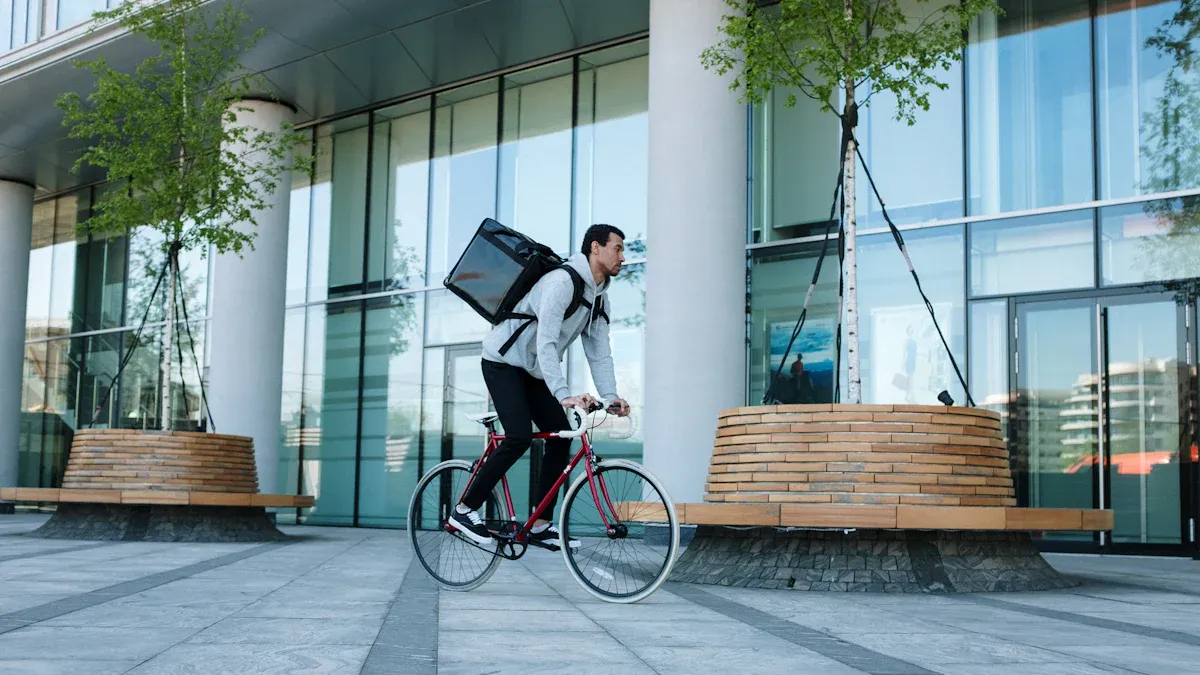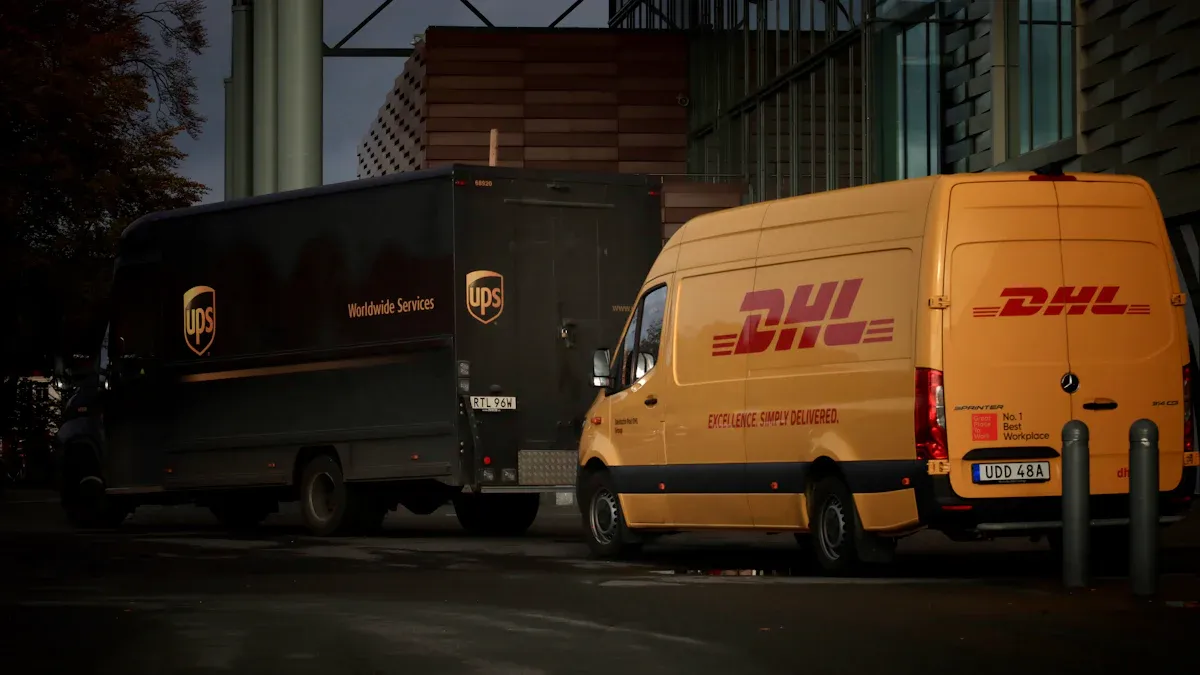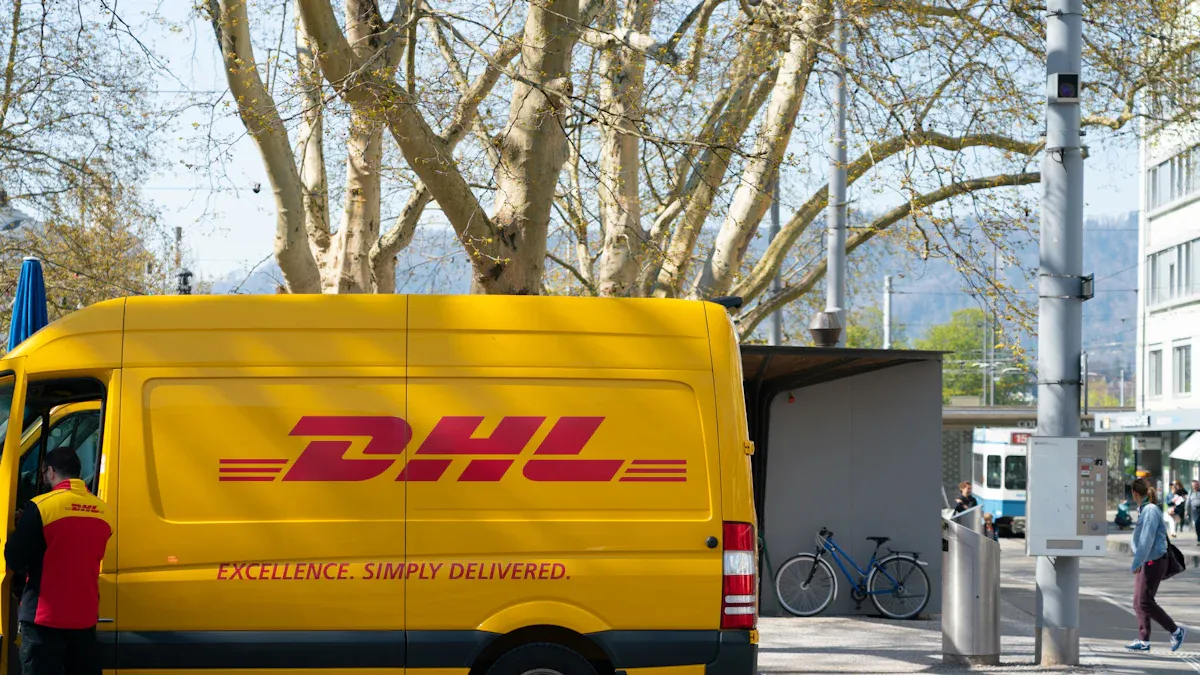Premier Global Logistics – Final Mile Delivery Solutions for East Coast Cities

Premier Global Logistics specializes in medical and pharmaceutical last mile logistics, expertly managing challenging deliveries in busy East Coast cities. With healthcare facilities increasing in cities like New York and Boston, census data reveals pharmacies have grown from 0.6 to 0.9 per area over fourteen years. Effective last mile delivery in this sector requires precise temperature control and strict regulatory compliance. Leveraging advanced technology, PGL ensures real-time monitoring and achieves a 95% on-time delivery rate, maintaining product safety throughout the process.
PGL employs innovative delivery solutions to guarantee every package arrives quickly and securely.
Key Takeaways
Premier Global Logistics fixes hard last mile delivery problems in busy East Coast cities. They use smart technology and small, eco-friendly vehicles. Medical deliveries must stay at the right temperature. They also follow many rules to keep medicine safe and patients healthy. Automated dispatch and real-time tracking help PGL deliver packages faster. These tools help avoid mistakes and keep customers updated. Micro freight models and local hubs cut down on traffic and pollution. They also make deliveries faster and more reliable. PGL uses green delivery with electric vehicles and smart routes. This helps keep the air clean and follows city environmental rules.
Urban Challenges in Last Mile Delivery

Traffic and Density
Cities like New York and Boston have special last mile delivery problems. Many people live close together, so streets are always busy. Delivery trucks must drive through crowded roads every day. There are lots of deliveries, but each one is usually small. This is true for medical supplies and online shopping orders.
Every year, city traffic gets worse. New York drivers lose 117 hours in traffic each year. Boston drivers lose even more, at 134 hours. These traffic jams make deliveries cost more. They also make it harder to deliver on time.
Trips during busy times now take about 7% longer.
More highways are crowded, going from 51% to 60%.
Delivery drivers deal with narrow roads, lots of people walking, and not much parking.
To help with these problems, companies use smart route planning with AI. They also use smaller vehicles like vans and bikes. These can move through tight spaces and busy areas. This helps make sure packages arrive on time.
Vehicle Restrictions
Many downtown areas do not allow big trucks. So, companies use smaller vehicles for last mile delivery. They also use micro-fulfillment centers close to where people live. This means packages travel less and get delivered faster.
Good loading zones and curb rules help stop illegal parking. This makes traffic better and helps deliveries go smoothly.
A shared system for loading bays helps couriers work together. It also makes the best use of city space.
Dynamic Delivery Points
Last mile delivery in cities often means delivery spots change a lot. Sometimes, customers ask for a new delivery place at the last minute. They might add new stops to a driver’s route.
Grouping stops close together saves time and boosts productivity.
Drivers who know the city well make fewer mistakes.
The last mile problem needs flexible solutions. Companies must change plans fast to keep up with new delivery needs. They use technology and better ways of working to keep service high.
More people want city deliveries, so there will be 36% more delivery vehicles by 2030. This means companies must keep finding new ways to solve last mile delivery problems.
Medical and Pharmaceutical Last Mile Logistics

Temperature Control
Medical and pharmaceutical last mile logistics need careful temperature control. Some products, like vaccines and advanced therapies, stop working if they get too hot or cold. In 2023 and 2024, the FDA said yes to new cell and gene therapies. These need to stay very cold. If the temperature changes even a little, these items can go bad. Real-time tracking and IoT monitoring help keep shipments safe. Same-day and next-day delivery, with help from local micro-hubs, lower the chance of temperature problems.
On-time delivery and keeping the right temperature are important measures.
Real-time tracking lets people watch shipments from start to finish.
AI helps drivers pick the best routes and keeps products safe.
Regulatory Compliance
Rules guide every part of last mile delivery for medical products. Companies must follow rules from the FDA, DSCSA, and HIPAA. These rules protect patient data and product safety. Drivers get special training and follow strict steps to avoid mistakes. Every shipment needs lots of paperwork and chain-of-custody records.
Aspect | Statistic / Detail |
|---|---|
Healthcare logistics costs | 30% of healthcare logistics costs come from the last mile |
Temperature-sensitive damage | Over 20% of these shipments get damaged from bad logistics |
Patient delivery expectations | 92% of patients want their healthcare deliveries on time |
Regulatory requirements | Must follow HIPAA and FDA rules for moving medicine |
Handling requirements | Need temperature control, chain-of-custody records, and special handling |
Cold Chain Management
Cold chain management keeps medicine safe from the hub to the user. Studies show that keeping products between 2°C and 8°C keeps them strong. Good cold chain management cuts down on waste and makes sure patients get what they need. In Turkey, vaccine checks from the main store to the end showed that good cold chain steps keep vaccines strong.
Good cold chain management in last mile delivery keeps patients safe and helps public health.
Medical and pharmaceutical last mile logistics need accuracy, rule-following, and strong cold chain steps. PGL’s solutions meet these needs and make sure deliveries are safe and on time in every city.
PGL Solutions for Last-Mile Logistics
Automated Dispatch
Premier Global Logistics uses automated dispatch to change last mile delivery in East Coast cities. These systems link warehouse stock with real-time schedules. Orders move from storage to delivery vehicles right away. Automated dispatch helps stop mistakes and makes everything faster. The system follows every order and changes routes if traffic is bad. It also sends quick messages to drivers and customers.
Orders get delivered faster because they leave the warehouse quickly.
Delivery times are shorter, so customers are happier.
Fewer mistakes happen, so there are less returns.
More packages arrive on time, showing good service.
The system picks the best routes for each delivery.
The system works well and keeps things running smoothly.
Automation saves time and money, so it is worth it.
Automated dispatch uses AI to change routes if traffic or weather is bad. The system finds a better way if needed. This helps PGL deliver on time and work better. Customers get their packages when they expect them. Businesses trust the delivery process more.
Automated messages and real-time tracking let customers see where their package is. This makes the experience easier and more reliable.
Light Vehicle Fleets
PGL uses light vehicle fleets in New York, Boston, Philadelphia, and Washington DC. These vehicles follow city rules for low emission zones. They can go where big trucks cannot. Light vans and electric vehicles move through busy streets and small spaces. This helps PGL follow rules and protect the environment.
Case Study | Location | Fleet Type | Key Benefits | Operational Insights | Environmental/Economic Benefits |
|---|---|---|---|---|---|
France, Italy, Spain | Light-duty EV vans (Class 1 & 2) | Over half fuel saved, no emissions | No special training, charging is important | Less pollution, saves money, fits LEZs | |
City of Ann Arbor | Ann Arbor, Michigan | Municipal light-duty EVs | 215 vehicles, pilot with 3 Bolt EVs | Leasing and funding matter, staff like them | Carbon neutral, more electric vehicles |
Studies show light vehicle fleets in LEZs make air cleaner and help people stay healthy. London’s LEZ cut air pollution by 12%. Berlin’s LEZ lowered CO2 by 20%. These vehicles help PGL avoid extra fees and lower costs. Light vehicle fleets make last mile delivery faster and easier. This is important for medical and pharmaceutical deliveries that need to be quick and safe.
Light vehicles help customers by reaching more places and handling last-minute changes.
Micro Freight Models
Micro freight models help PGL with last-mile delivery in crowded cities. PGL puts micro-depots and urban centers close to customers. Drivers pick up many orders at once and deliver them in one trip. This means fewer vehicles are needed and there are less empty trips.
Urban centers put goods in one place, so delivery is easier.
Route technology uses real-time data to save fuel and time.
Pre-order systems group deliveries by area or time, so vehicles carry more.
Machine learning guesses delivery needs, so PGL can plan better.
Micro freight models help the environment too. Using smaller vehicles and fewer trips means less pollution and less traffic. Businesses get faster and more reliable deliveries. Cities have less noise and cleaner air.
Micro freight models are new ways to deliver that balance speed, cost, and the environment in last-mile logistics.
Risk Mitigation and Sustainability
Real-Time Monitoring
Premier Global Logistics uses real-time monitoring to keep deliveries safe. Their tracking systems watch every package from start to finish. This helps managers find problems early and fix them fast. Studies show that watching data helps lower risks. Companies with real-time tracking can stop problems before they get worse. For example, supply chain software lets teams see risks up to 10 days ahead. This helps PGL deliver on time and keep products safe. Secure tools like eSignatures and photo proof make deliveries more accurate and build customer trust.
Contingency Planning
Delivering in cities is hard because of traffic and sudden changes. PGL gets ready for these problems with strong backup plans. They use smart tools to guess costs and change delivery plans. For example, Stuller made shipping better by using data and planning for trouble. In 2022, Shanghai had a lockdown, but quick plans kept deliveries going even when half the centers closed. PGL uses these ideas to keep last mile delivery working, even in emergencies. These plans help keep service steady and lower missed deliveries.
Low-Emission Operations
PGL works to make deliveries better for the environment. They use low-emission vehicles and eco-friendly packaging. Cities like Portland and Stockholm use electric vehicles and share data to cut pollution. London’s Ultra Low Emission Zone lowered NO₂ by 46% in the city center. Madrid’s low-emission zone cut NO₂ by 35% and helped stores sell more. Over 320 cities in Europe now have low-emission zones, and more are coming. PGL uses electric vans, smart routes, and green habits to help air stay clean and people stay healthy. Their plan uses technology, good planning, and care for the environment to make last mile delivery fast and green.
Case Studies and Results
Urban Delivery Success
Premier Global Logistics has a great record for last mile delivery in big East Coast cities. In New York, Boston, Philadelphia, and Washington DC, PGL uses smart routes, real-time tracking, and light vehicles to help busy city areas. The table below shows how these cities use new delivery ideas:
City | EV Charging Points | LEED-Certified Buildings | Sustainable Urban Initiatives | |
|---|---|---|---|---|
New York City | 62 | Extensive | N/A | Zero-waste programs, Smart City Testbed |
Boston | 44 | 521 | 489 | Green New Deal, Smart Utilities Program |
Washington DC | 53 | Extensive | 1,964 | Sustainable architecture, smart transport |
Philadelphia is special because it is easy to walk around and has a small downtown. PGL drivers can reach more places by walking, which makes deliveries faster and better for customers. The company can change routes quickly and handle last-minute requests. This helps them deliver on time, even when the city is very busy.
Cold Chain Excellence
PGL follows strict cold chain rules for medical and pharmaceutical last mile delivery. The team uses vehicles that control temperature and checks shipments often to keep products safe. Important results are shown in the table below:
Outcome Measure | Description |
|---|---|
Vaccines stay between +2°C and +8°C during transport | |
Lead-time delivery | Fast delivery to clinics and hospitals |
Frequency of stockouts | Low stockout rates show reliable supply |
Temperature monitoring | Checks at start and end points ensure compliance |
PGL’s tracking system warns staff if the temperature changes. This lets them fix problems fast. It keeps products safe and helps healthcare clients trust PGL.
Sustainable Impact
PGL’s last mile delivery model helps cities stay green for a long time. The company uses electric vehicles, smart routes, and local hubs to lower pollution. These actions bring real results:
Last mile delivery causes 40% of e-commerce pollution, so green ideas are important.
Smart routes save fuel and cut down on CO2.
Electric vehicles and smart packaging make less waste and cost less.
Customers like green delivery, which helps them trust and like the brand.
PGL’s focus on being green helps clients follow new rules and gives customers a better experience.
Premier Global Logistics brings safe and fast last mile delivery for medical and pharmaceutical products in East Coast cities. They use IoT, big data, and automated systems to track packages in real time. This makes their service reliable. Studies show that using new logistics technology helps keep the air cleaner and saves resources. PGL’s risk management and green habits help clients follow tough rules. Companies who want dependable city delivery can count on PGL for smart and quick solutions.
Want to make your last mile delivery better? Let Premier Global Logistics help plan your city delivery strategy.
FAQ
What types of deliveries does Premier Global Logistics handle in East Coast cities?
PGL delivers medical, pharmaceutical, e-commerce, and FMCG items. The team handles many small shipments for clinics, offices, and stores. They use light vehicles and automated dispatch for quick, reliable service.
How does PGL ensure temperature-sensitive products stay safe during last mile delivery?
PGL uses vehicles that control temperature and real-time tracking. Drivers check shipments at each step. The system warns staff if the temperature changes. This keeps vaccines, medicines, and samples safe from start to finish.
Can PGL support same-day or scheduled deliveries for urban businesses?
Yes. PGL offers same-day, next-day, and scheduled deliveries. The dispatch system matches delivery times with what businesses need. Clients can book set times for hospitals, offices, or events. This helps businesses plan better.
How does PGL help clients meet low-emission zone (LEZ) requirements?
PGL uses light vehicles and electric vans in LEZs. The fleet follows city rules and lowers emissions. This helps clients avoid fines and reach their sustainability goals.
What makes PGL different from traditional trucking companies?
PGL focuses on small, precise deliveries in cities. The company uses automated dispatch, real-time tracking, and micro-depots. This makes last mile service fast, flexible, and reliable in busy city areas.
See Also
Understanding Premier Global Logistics B2B Warehousing On East Coast
Fast Order Fulfillment With Premier Logistics Warehousing In NJ And FL
PGL Miami Warehouse Solutions Ensure Quick Delivery Across East Coast
Enhancing West Coast Operations Through Premier Logistics LA Warehousing
Top Reasons To Select Premier Global Logistics For Export Shipping
